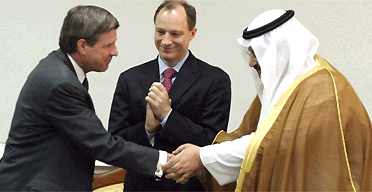 |
| Paul Bremer wita się z Prezydentem tymczasowym w Iraku Ghazi al-Yawar |
Był to dzień spokojny i bardzo cichy w Babilonie. Słońce już grzało od rana. W stołówce tłok, bo chłodno było wewnątrz. Na zewnątrz skwar i trudno wręcz oddychać. Było spokojnie. Do czasu. Piliśmy kawę w biurze i zza małego okna dało się zauważyć jakieś przyśpieszone ruchy dziennikarzy. Jeden wybiegł z kontenera, który był domem, studiem i czym tam jeszcze - drugi już rozmawiał z Warszawą przez telefon. Inni coś tam wołali jeden do drugiego. W sumie mały niepokój się stworzył. Już nie pamiętam który z nich pierwszy mnie wyciągnął na ten skwar podstępem, że niby na kawunię ale już każdy z nich miał mikrofon czy dyktafon w ręku i mi tu pod usta przykładają z pytaniem: Co Dywizja wie o przekazaniu władzy przez ambasadora Paula Bremera III w Bagdadzie? Ja tu oczy jak wół wybałuszam i nie mogę słowa wykrztusić. Zatkało mnie cholernie. - Panie pułkowniku, dowódca prosi do siebie - krzyknął chorąży Adamczewski do mnie co pozwoliło mi szybko się od mediów oddalić pozostawiając jedynie po sobie przykry widok niezorientowanego oficera, rzecznika.
Od miesięcy całych trwały w Bagdadzie przygotowania do przekazania dowodzenia i odpowiedzialności władzom cywilnym Iraku. Były konferencje, narady, spotkania na szczeblu, rozmowy kuluarowe i wszystko to w mgnieniu oka przestało mieć jakiekolwiek znaczenie. Jak to mówili mi potem zorientowani Paul Bremer był się spakował (ponoć walizy pełne skarbów irackich), wsiadł do śmigłowca i tyle go widziano.
Wiedziałem, że to straszny afront i że nie powiadomił nawet swoich podwładnych, w tym naszego generała choć ponoć i tak miał kiedyś wyjechać z Iraku. Nikt jednak nie wiedział, że uczyni to w takim stylu. Plotki głosiły, że zabrał z sobą co cenniejsze pamiątki z kolebki cywilizacji ale jak to plotki żyją jedne długo, drugie krótko.
Rozmowa z mediami nie była prosta. Prawdę mówiąc omijałem śliski temat jak mogłem i w sumie nawet dopatrzyłem się współczucia samych mediów z powodu dostania w policzek od samego Bremera. Cóż, dość zabolało, bo to i niespodziewane i niezaplanowane wydarzenie dostatecznie już przeważyło szalę mojego (naszego) przykładania się do idei sojuszniczej walki i braterstwa broni. W sumie w kantynie potem wieczorem wylano na Paula Bremera wiadro czegoś tam nie zbyt miłego, utopiono tysiąc razy i w ten sposób uczciliśmy to ważkie wydarzenie w 6-miesięcznym już życiu w Iraku za "wolność waszą i naszą".
Potem było już tylko gorzej.
Media pisały:
http://www.lewica.pl/index.php?id=6966&tytul=Irak-%27odzyska%B3-suwereno%B6%E6%27
http://www.theguardian.com/world/2004/jun/28/iraq.iraq1
http://www.historycommons.org/context.jsp?item=CPATurnsOverSoveriegnt2Iraq




















